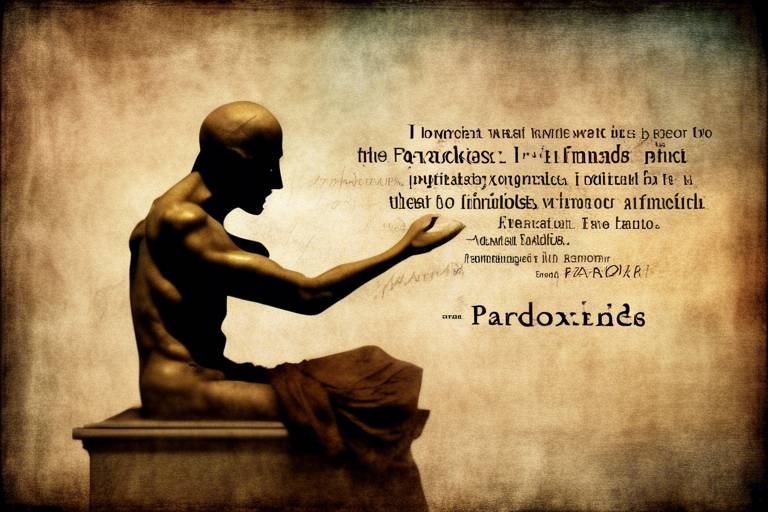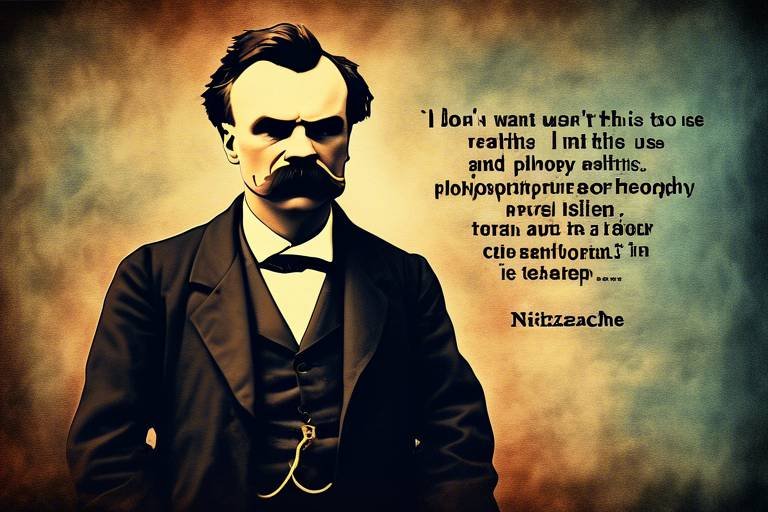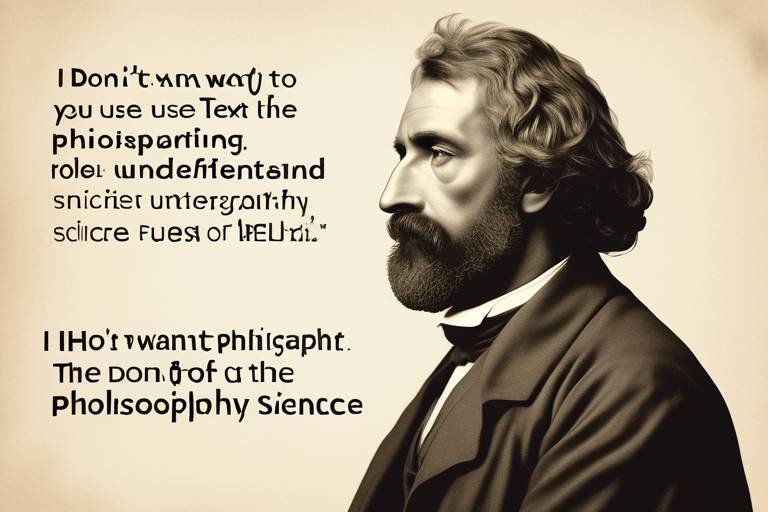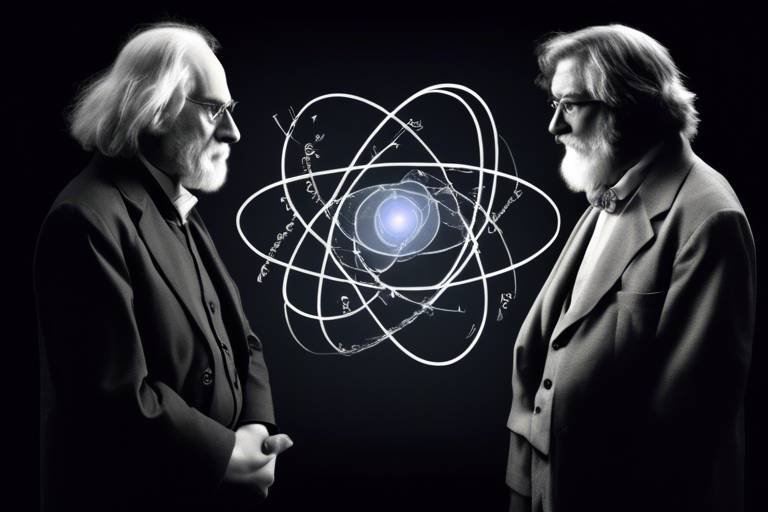Revisiting the Philosophy of Humour
Humour is a fascinating lens through which we can examine the complexities of human existence. It’s not just about a good laugh; it’s a profound reflection of our thoughts, beliefs, and the very fabric of our society. When we dive into the philosophy of humour, we uncover layers of meaning that can reshape our understanding of life itself. Think of humour as a mirror that reflects not only our personal experiences but also the collective psyche of our culture. It’s like a social glue that binds us together, allowing us to navigate the often turbulent waters of human interaction with a bit of levity.
At its core, humour serves multiple purposes. It can be a tool for connection, helping us bond with others through shared laughter. It can also act as a defense mechanism, providing a way to cope with the absurdities and hardships of life. In this sense, humour is much more than just entertainment; it’s a vital part of our survival toolkit. Just as a ship needs a sturdy anchor to weather the storm, we need humour to keep our spirits afloat amidst the chaos of existence.
Furthermore, humour is deeply intertwined with philosophical inquiry. Philosophers throughout history have pondered the nature and significance of humour. They’ve asked questions like: What makes something funny? Why do we laugh? And how does humour reflect our understanding of morality and ethics? These inquiries lead us to explore various philosophical perspectives, from the ancient musings of Aristotle and Plato to the modern theories that challenge our perceptions of humour in today’s society.
As we embark on this journey to revisit the philosophy of humour, we’ll explore its nature, historical perspectives, and its reflection on human nature. We’ll also delve into how cultural contexts shape our understanding of humour and the role of satire as a vehicle for social commentary. So, buckle up! This exploration promises to be as enlightening as it is entertaining, revealing the intricate dance between laughter and philosophy.
- What is the philosophical significance of humour? Humour helps us understand complex social dynamics and reflects our values, beliefs, and coping mechanisms.
- How has humour evolved through history? Humour has changed with cultural and philosophical movements, influenced by historical figures and societal norms.
- What role does satire play in humour? Satire is a powerful tool for social critique, allowing us to question and challenge prevailing ideologies.

The Nature of Humour
Understanding what humour truly is can feel like trying to catch smoke with your bare hands. It’s elusive, multifaceted, and deeply intertwined with our shared experiences. At its core, humour is a complex interplay of timing, context, and cultural nuances. It’s not just about telling a joke; it’s about the connection we forge with others through laughter. Imagine sitting around a campfire, sharing stories that evoke chuckles and belly laughs—this is where humour thrives, bringing people together in a delightful dance of wit and banter.
Various definitions of humour have emerged over time, each shedding light on its essence. For instance, some philosophers argue that humour arises from the incongruity between what we expect and what actually occurs. Think of a classic slapstick scene where a character slips on a banana peel; the unexpectedness of the moment triggers laughter. Others suggest that humour serves as a social bonding tool, allowing us to navigate the complexities of human relationships. It’s like a glue that holds our interactions together, making the tough moments a bit lighter.
When we delve into the theories surrounding humour, we encounter a rich tapestry of ideas. The superiority theory posits that we laugh at others’ misfortunes, feeling a sense of superiority over them. This can be seen in the popularity of shows like America’s Funniest Home Videos, where we chuckle at the mishaps of others. Conversely, the relief theory suggests that humour acts as a pressure valve, releasing pent-up emotions and stress. After a long day, a good laugh can feel like a refreshing breeze on a hot summer day.
Furthermore, cultural context plays a significant role in shaping humour. What’s hilarious in one culture might fall flat in another. For example, British humour often leans towards dry wit and sarcasm, while American humour might embrace a more exaggerated style. This divergence highlights how humour is a reflection of our cultural values and societal norms. Just like a chameleon adapts to its environment, humour morphs to resonate with the audience it encounters.
In summary, humour is not merely a collection of jokes or comedic routines; it’s a profound reflection of our human experience. It acts as a mirror, revealing our psychological states, social interactions, and cultural backgrounds. As we continue to explore the intricate relationship between humour and philosophy, we uncover layers of meaning that enrich our understanding of both. So, the next time you share a laugh, remember that you’re participating in a timeless tradition that connects us all.
- What is the main purpose of humour? Humour serves to entertain, relieve stress, and foster social connections.
- How does culture influence humour? Different cultures have unique styles and norms that shape what is considered funny.
- Can humour be used for social change? Absolutely! Humour, especially satire, can challenge societal norms and provoke thought.

Historical Perspectives on Humour
Humour is not just a modern phenomenon; it has a rich tapestry woven through the fabric of history. From the ancient philosophers to contemporary thinkers, the evolution of humour reflects the changing dynamics of society, culture, and human thought. By examining how historical figures and eras have shaped our understanding of humour, we can appreciate its profound impact on our lives today.
In ancient times, philosophers like Aristotle and Plato laid the groundwork for our understanding of humour. Aristotle, in his work "Poetics," suggested that laughter is a form of human expression that serves not just to entertain but also to provide insight into our moral and ethical frameworks. He believed that humour could reveal truths about human nature, acting as a mirror reflecting our virtues and vices. Plato, on the other hand, was more skeptical. He viewed laughter as something that could undermine serious discourse, suggesting that it often arises from a sense of superiority over others, which could lead to moral corruption.
As we transitioned into the Medieval and Renaissance periods, the perception of humour shifted significantly. During these times, humour was often intertwined with social hierarchies and moral teachings. The medieval church, for instance, utilized humour as a tool for moral instruction, employing jesters and fools to convey serious messages about sin and virtue. This era saw humour as a reflection of societal order, where laughter was permitted only within certain bounds, often reinforcing the status quo.
The Renaissance brought a renewed interest in humanism, which celebrated individual experience and expression. Thinkers like Desiderius Erasmus explored the concept of folly, suggesting that embracing our foolishness through humour could lead to greater wisdom. This period marked a significant transformation where humour became a means to critique societal norms rather than simply conforming to them. The use of satire began to emerge as a powerful tool, allowing writers and artists to challenge authority and provoke thought.
Fast forward to the Enlightenment and modern philosophy, where humour was further dissected by thinkers such as Immanuel Kant and Arthur Schopenhauer. Kant posited that humour arises from the incongruity between what we expect and what actually occurs, a concept that still resonates in comedic theory today. Schopenhauer took a more pessimistic view, arguing that humour serves as a coping mechanism for the absurdities of life, allowing us to laugh at the inherent contradictions of existence.
The evolution of humour through these historical lenses reveals its dual nature: it can be a source of joy and a weapon for critique. Each era has contributed to our understanding of humour, shaping it into a complex social tool that reflects and challenges the human condition. As we delve deeper into the nuances of humour, it becomes clear that its historical perspectives not only inform our present but also guide our future interactions with this essential aspect of human life.
- What is the significance of humour in philosophy?
Humour in philosophy serves as a tool for understanding human nature, ethics, and societal norms, reflecting deeper truths about existence. - How has the perception of humour changed over time?
Historically, humour has evolved from a moral tool in medieval times to a means of social critique during the Renaissance, and now serves multiple roles in contemporary society. - Who are some key philosophers associated with humour?
Notable figures include Aristotle, Plato, Erasmus, Kant, and Schopenhauer, each contributing unique perspectives on the role of humour in human experience.

Ancient Philosophies
When we dive into the realm of ancient philosophies, we find ourselves face-to-face with some of the greatest thinkers who ever walked the earth. Figures like Aristotle and Plato didn't just ponder the meaning of life; they also explored the nuances of humour and its significant role in the human experience. Imagine sitting in a sunlit courtyard in ancient Athens, engaging in debates that would shape the very fabric of Western thought. These philosophers recognized that laughter is not merely a reaction; it’s a complex interplay of social dynamics, ethics, and the human psyche.
Aristotle, for instance, viewed humour as a form of social commentary. He believed it could reveal truths about human nature and societal norms. In his work, he suggested that laughter often arises from the perception of incongruity—when things don’t quite align with our expectations. This idea resonates even today, as we often find ourselves laughing at the unexpected twists of life. Aristotle’s insights laid the groundwork for understanding humour not just as entertainment but as a valuable tool for examining our moral compass.
On the other hand, Plato took a more critical stance on humour, particularly in relation to ethics. In his dialogues, he argued that laughter could sometimes lead to moral degradation. For Plato, humour had the potential to undermine serious discourse and distract from the pursuit of truth. He was concerned about the implications of laughter in society and how it could foster a culture of superficiality rather than depth. This tension between the liberating and potentially destructive nature of humour continues to be a relevant topic in modern philosophical discussions.
To better understand these ancient perspectives, let's consider the key ideas from both philosophers in a table:
| Philosopher | View on Humour | Key Concepts |
|---|---|---|
| Aristotle | Humour as social commentary | Incongruity, truth revelation |
| Plato | Humour as a potential moral danger | Superficiality, distraction from truth |
These ancient ideas set the stage for a rich tapestry of thought regarding humour. They remind us that laughter is not just a fleeting moment of joy; it can be a profound reflection of our values and beliefs. In a way, humour acts as a mirror, reflecting our ethical dilemmas and societal structures. As we continue to explore the philosophy of humour, we can appreciate how these ancient insights remain relevant today, inviting us to consider not just what makes us laugh, but why we laugh in the first place.

Medieval and Renaissance Views
The Medieval and Renaissance periods marked a significant evolution in the understanding of humour, intertwining it with social hierarchies and moral philosophies. During the Middle Ages, humour was often viewed through the lens of morality and ethics, reflecting the prevailing religious and societal norms. Think about it: the church held considerable power, and with that came a certain expectation of decorum. Humour was frequently used as a means to convey moral lessons, often wrapped in the guise of jest. This duality can be likened to a jester who, while entertaining, also served as a vehicle for social critique.
In this context, humour was not merely for amusement; it was a tool for social commentary and a means to reinforce societal values. For instance, the works of medieval playwrights and poets often included elements of satire, poking fun at the vices of the nobility or the hypocrisy of the clergy. This satirical use of humour can be seen as a precursor to modern political satire, where the absurdities of power are laid bare for all to see.
As we transitioned into the Renaissance, the relationship between humour and humanism began to flourish. The Renaissance thinkers, inspired by classical antiquity, began to explore humour as a reflection of human experience rather than just a moralistic tool. Figures like Erasmus and Rabelais infused their works with a sense of wit and irony, challenging traditional views and encouraging a more playful engagement with the world. This shift can be likened to opening a window to let in fresh air; it allowed for a more vibrant and diverse exploration of human nature.
Moreover, the Renaissance saw the emergence of the concept of “wit”, which was celebrated as a mark of intelligence and sophistication. This period emphasized the importance of cleverness and the ability to engage in humorous repartee, suggesting that humour could be a sign of social status. In essence, humour became a social currency, a way to navigate the complex hierarchies of Renaissance society.
To illustrate the evolution of humour during these eras, consider the following table that contrasts key aspects of Medieval and Renaissance views on humour:
| Aspect | Medieval Views | Renaissance Views |
|---|---|---|
| Purpose | Moral instruction, social critique | Exploration of human experience, wit |
| Influence | Religious and societal norms | Humanism, classical antiquity |
| Expression | Satire, jesting | Clever repartee, irony |
| Social Role | Reinforcement of values | Social status, intellectual engagement |
In summary, the Medieval and Renaissance periods redefined humour, transforming it from a mere source of entertainment into a complex interplay of morality, social structure, and human experience. This evolution laid the groundwork for modern interpretations of humour, illustrating how it can reflect and shape societal values. As we delve deeper into the philosophical implications of humour, we can see how these historical views continue to influence our understanding today.
- What role did humour play in Medieval society? Humour served as a moral compass and a means of social critique, often reflecting the values and norms of the time.
- How did the Renaissance change the perception of humour? The Renaissance shifted the focus from moralistic views to a celebration of wit and human experience, encouraging a more playful engagement with life.
- Can humour be considered a form of social currency? Yes, during the Renaissance, cleverness and wit became markers of social status, allowing individuals to navigate complex social hierarchies.

Modern Philosophical Theories
As we journey through the landscape of modern philosophy, we encounter an array of theories that have profoundly influenced our understanding of humour. Thinkers from the Enlightenment onward have dissected humour with a critical eye, exploring its implications for society and individual psychology. One of the most significant contributions comes from Immanuel Kant, who argued that humour arises from a discrepancy between our expectations and reality. According to Kant, laughter is a response to the incongruity we perceive in situations that deviate from what we consider normal or appropriate.
Moving forward in time, Henri Bergson introduced the idea that humour serves a social purpose. In his essay, "Laughter," Bergson posits that humour acts as a mechanism for social correction. It highlights the absurdities of human behavior, nudging us to conform to societal norms. This perspective emphasizes that humour is not just about personal amusement; it plays a crucial role in maintaining social order. Imagine humour as a mirror reflecting our collective quirks, prompting us to laugh at ourselves while also encouraging self-improvement.
Another significant modern theorist is Sigmund Freud, who approached humour from a psychological angle. Freud believed that humour provides a way to express repressed thoughts and emotions, allowing individuals to confront uncomfortable truths in a socially acceptable manner. He categorized humour into different types, such as wit, which serves as a defense mechanism, and jokes, which can reveal underlying desires. This duality of humour—both a source of joy and a vehicle for deeper understanding—has sparked extensive debates among philosophers and psychologists alike.
Moreover, the advent of existentialism brought forth a new lens through which to view humour. Thinkers like Albert Camus and Jean-Paul Sartre explored the absurdity of existence, suggesting that humour is a natural response to the inherent chaos of life. In this light, humour becomes a form of rebellion against the absurd, a way to find meaning amidst the madness. Camus famously stated, "The struggle itself toward the heights is enough to fill a man's heart. One must imagine Sisyphus happy." This perspective invites us to embrace humour as a coping mechanism, a means to navigate the complexities of human existence.
To summarize, modern philosophical theories about humour reveal its multifaceted nature. From Kant's incongruity theory to Bergson's social function, Freud's psychological insights, and existentialist interpretations, humour is a rich tapestry woven into the fabric of human experience. It not only entertains but also challenges, critiques, and ultimately enriches our understanding of life and society. As we continue to explore humour's role in our lives, we uncover deeper connections to our shared humanity, reminding us that laughter is, indeed, a universal language.
- What is the role of humour in modern philosophy? Modern philosophy explores humour as a complex interplay of social, psychological, and existential factors, revealing its significance beyond mere entertainment.
- How do different philosophers view humour? Different philosophers, like Kant, Bergson, and Freud, offer varied perspectives on humour, from incongruity and social correction to psychological expression.
- Can humour help in coping with life's challenges? Yes, many modern theories suggest that humour serves as a coping mechanism, helping individuals navigate the absurdities of life.

Humour and Human Nature
Humour is often described as a universal language, a bridge that connects individuals across diverse backgrounds. But what is it about humour that resonates so deeply with our human nature? To put it simply, humour serves as a reflection of our psychological states, acting as a mirror that reveals our innermost feelings, fears, and desires. When we laugh, we are not just responding to a joke; we are engaging in a complex interplay of emotions that can reveal much about who we are as individuals and as a society.
At its core, humour is a coping mechanism. Life is full of challenges, and sometimes, the best way to deal with stress is to laugh about it. Think of humour as a pressure valve for our emotions. When faced with adversity, we often turn to laughter to lighten the mood and regain a sense of control. This is especially evident in situations where the absurdity of life is laid bare. For example, consider the classic saying, "If you don't laugh, you'll cry." It perfectly encapsulates how humour allows us to process difficult emotions. By finding the funny side of a situation, we can transform our perspective and reduce the weight of our burdens.
Moreover, humour plays a vital role in our social interactions. It fosters connections between people, breaking down barriers and creating a sense of belonging. When we share a laugh, it creates a bond that can transcend cultural and linguistic differences. Think of humour as a social lubricant that helps to ease tension and forge friendships. In fact, studies have shown that people who share a similar sense of humour are more likely to form lasting relationships. This is because humour often reflects shared values and experiences, making it a powerful tool for building community.
Interestingly, humour also serves as a defense mechanism. It allows us to confront uncomfortable truths and societal taboos in a way that feels safe. For instance, comedians often tackle sensitive subjects, using satire to highlight the absurdities of our world. By laughing at our flaws and failures, we gain a sense of agency over them. This is why humour can be a potent form of social commentary, challenging the status quo and prompting us to rethink our beliefs and behaviors.
In summary, humour is not merely a source of entertainment; it is a fundamental aspect of our human experience. It reflects our coping mechanisms, strengthens our social bonds, and allows us to confront uncomfortable truths. As we delve deeper into the philosophy of humour, we uncover its profound implications for understanding human nature. So, the next time you share a laugh, remember that you are participating in a rich tapestry of emotional and social dynamics that define what it means to be human.
- What is the role of humour in human relationships? Humour helps to create connections and bonds between individuals, making social interactions more enjoyable and meaningful.
- Can humour be a coping mechanism? Yes, humour allows individuals to deal with stress and adversity by providing a lighter perspective on difficult situations.
- How does humour reflect cultural values? Different cultures interpret and express humour in unique ways, revealing the underlying beliefs and norms of those societies.
- Is humour linked to intelligence? Research suggests that there may be a correlation between a person's sense of humour and their cognitive abilities, though this varies widely among individuals.

Humour in Cultural Contexts
Humour is not just a universal language; it’s a cultural tapestry woven from the threads of societal norms, beliefs, and values. It acts as a reflection of the culture it emerges from, revealing not only what people find funny but also what they hold dear. For instance, consider how a joke that might elicit belly laughs in one culture could fall flat in another. This discrepancy highlights the intricate relationship between humour and cultural context, which can be influenced by factors such as history, religion, and social structures.
In many cultures, humour serves as a coping mechanism, a way to navigate the complexities of life. In times of stress or uncertainty, people often turn to laughter as a form of relief. For instance, during difficult times, communities may use humour to bond and uplift one another. This is evident in various traditions around the world where storytelling and comedic performances are integral to cultural celebrations. In essence, humour becomes a shared experience that reinforces communal ties.
Moreover, the role of humour can vary significantly across different cultural landscapes. For example:
- In the United States: Stand-up comedy thrives, often pushing boundaries and addressing taboo subjects, reflecting a culture that values freedom of expression.
- In Japan: Humour often relies on subtlety and wordplay, with a strong emphasis on social harmony, which can make it more challenging for outsiders to appreciate fully.
- In Brazil: The tradition of carnival brings forth a vibrant display of humour through satire, showcasing a playful critique of social issues.
This cultural variance not only shapes the type of humour that emerges but also influences how it is received. For instance, satire, which is often used to critique political systems, may be embraced in one culture while being met with resistance in another. Understanding these nuances is crucial for anyone looking to appreciate or engage with humour across different contexts.
Additionally, humour can serve as a social barometer, reflecting the values and tensions within a society. In many cases, the jokes that circulate can indicate underlying issues, such as inequality or political discontent. For example, in countries facing political oppression, satire becomes a powerful tool for dissent, allowing individuals to voice their frustrations in a way that is both clever and impactful. This illustrates how humour can transcend mere entertainment, becoming a form of social commentary that resonates deeply with the audience.
As we delve deeper into the complexities of humour across cultures, it becomes clear that it is more than just a source of amusement. It is a vital component of cultural identity, a means of communication, and a reflection of societal values. By examining humour in various cultural contexts, we can gain insights into the human experience, revealing the shared joys and struggles that connect us all.
- Why is humour important in different cultures? Humour serves as a reflection of cultural values and beliefs, helping people cope with challenges and build connections.
- How does satire differ across cultures? Satire can vary widely; some cultures embrace it as a form of political critique, while others may view it as disrespectful.
- Can humour be a form of social commentary? Absolutely! Humour often highlights societal issues, making it a powerful tool for sparking dialogue and change.

Cross-Cultural Comparisons
When we dive into the world of humour, it's fascinating to realize that what tickles one person's funny bone might leave another scratching their head in confusion. This cross-cultural comparison of humour reveals the intricate tapestry of societal norms, values, and beliefs that shape our understanding of what is funny. For instance, in Western cultures, sarcasm and irony often reign supreme, while in many Eastern cultures, humour tends to be more subtle and context-driven. This divergence highlights how humour is not just a universal language; it’s also a reflection of cultural identity.
To illustrate this point, consider the different ways humour manifests in various regions:
| Culture | Humour Style | Typical Themes |
|---|---|---|
| Western | Satirical, Sarcastic | Politics, Social Norms |
| Eastern | Subtle, Contextual | Family, Relationships |
| Latin American | Physical Comedy, Wordplay | Everyday Life, Love |
In Western societies, humour often serves as a vehicle for social critique. Comedians like Jon Stewart and John Oliver have built their careers on satirical commentary, using wit to dissect political issues and societal flaws. Their humour resonates with audiences who appreciate a good laugh while grappling with serious topics. On the other hand, in cultures such as Japan, humour is deeply embedded in social interactions and often involves a level of self-deprecation. Japanese comedians, known as 'owarai,' frequently employ puns and wordplay, showcasing a unique style that reflects their cultural emphasis on harmony and community.
Moreover, the role of humour in fostering social bonds cannot be overstated. In many cultures, sharing a laugh can break down barriers and create connections. For instance, in Mediterranean cultures, humour is often loud and boisterous, with a focus on storytelling that involves the audience. This interactive style not only entertains but also strengthens community ties. In contrast, Scandinavian humour tends to be more understated and dry, reflecting a cultural preference for modesty and humility.
As we explore these cultural differences, it's essential to consider how humour can serve as a reflection of societal values. For example, in cultures where individualism is celebrated, humour may lean towards self-empowerment and personal anecdotes. Conversely, in collectivist societies, humour often revolves around shared experiences and communal narratives. This distinction not only highlights the diversity of humour but also emphasizes its role as a mirror to our cultural identities.
In conclusion, the cross-cultural comparisons of humour reveal a rich landscape of human expression. Understanding these differences not only enriches our appreciation for what makes us laugh but also enhances our ability to connect with others across cultural divides. So, the next time you find yourself laughing at a joke, take a moment to ponder the cultural nuances that shape your sense of humour. It’s a beautiful reminder of our shared humanity, even amidst our delightful differences.
- What influences humour in different cultures? Cultural norms, historical contexts, and societal values greatly influence humour, shaping what is considered funny in each society.
- Why is humour important in social interactions? Humour fosters connections, eases tensions, and can serve as a tool for social critique, making it vital for effective communication.
- Can humour vary within a single culture? Absolutely! Different regions, age groups, and social contexts within a culture can lead to varied interpretations of humour.

The Role of Satire
Satire has been a potent tool for social critique and commentary throughout history, wielding the power to provoke thought and inspire change. It is often said that “laughter is the best medicine,” but in the case of satire, it serves as a scalpel that cuts through the facade of societal norms, exposing the absurdities and injustices that lie beneath. By using humor as a lens, satirists can highlight the flaws in political systems, cultural practices, and human behavior, prompting audiences to reflect critically on their beliefs and actions.
One of the remarkable aspects of satire is its ability to engage audiences in a way that straightforward criticism often cannot. When a satirist crafts a narrative filled with wit, irony, and exaggeration, they invite the audience to laugh while simultaneously encouraging them to think. This dual engagement can lead to a deeper understanding of complex issues. For instance, consider the work of satirical shows like "Saturday Night Live" or "The Daily Show." These platforms not only entertain but also inform viewers about political events and social issues, often using humor to make difficult topics more digestible.
Moreover, satire often acts as a mirror reflecting society's values and contradictions. It can reveal the hypocrisy of public figures and institutions, making it a powerful form of accountability. For example, the satirical publication "The Onion" uses absurdity to spotlight real-world issues, making readers question what is truly happening around them. This form of humor can be disarming, allowing individuals to confront uncomfortable truths without the heaviness that often accompanies serious discourse.
However, the effectiveness of satire is not universally accepted. Some argue that it can perpetuate misunderstandings or reinforce stereotypes, especially if the audience lacks the context to fully grasp the intended message. To navigate this, satirists must strike a balance between humor and clarity, ensuring that their commentary is accessible and thought-provoking. This is where the cultural context plays a crucial role; what may be funny in one culture could fall flat or even offend in another.
In today's digital age, the role of satire has expanded dramatically. Social media platforms have allowed satirical content to spread like wildfire, reaching audiences far beyond traditional media. This democratization of satire means that anyone with a clever idea can contribute to the conversation, but it also raises questions about the quality and intent of the content being shared. As a result, it is essential for consumers of satire to approach it with a discerning eye, recognizing the difference between genuine critique and mere sensationalism.
In conclusion, satire is not just a form of entertainment; it is a vital component of public discourse. It challenges us to question authority, reflect on our societal values, and engage with the world around us. Through laughter, we can tackle serious issues, making satire an indispensable tool for social commentary and change.
- What is satire? Satire is a genre of literature, performing arts, and other media that uses humor, irony, exaggeration, or ridicule to criticize or mock individuals, institutions, or societal norms.
- How does satire influence public opinion? By presenting issues in a humorous light, satire can make complex topics more relatable, encouraging critical thinking and discussion among audiences.
- Can satire be harmful? Yes, if not crafted carefully, satire can reinforce stereotypes or spread misinformation, especially if audiences misinterpret the intended message.
- Why is satire important in society? Satire serves as a check on power, holding public figures accountable and prompting discussions about moral and ethical issues in society.
Frequently Asked Questions
- What is the essence of humour?
Humour is a complex interplay of timing, context, and cultural nuances. It's not just about making someone laugh; it's about connecting with them on a deeper level. Think of humour as a bridge that links our experiences and emotions, allowing us to navigate through life's challenges with a lighter heart.
- How has humour evolved throughout history?
Humour has significantly transformed over centuries, shaped by cultural and philosophical movements. From the witty quips of ancient philosophers like Aristotle to the satirical works of modern comedians, each era has left its mark on how we perceive and appreciate humour. It's like a living organism, adapting to the social climates of its time.
- What role does humour play in human nature?
Humour is a reflection of our fundamental human traits. It serves as a coping mechanism, helping us deal with stress and adversity. Moreover, it fosters social interactions, breaking down barriers and creating bonds between people. Just like a warm hug, a good laugh can make us feel connected and understood.
- Why is cultural context important in understanding humour?
Cultural influences shape the way humour is expressed and interpreted. What might be hilarious in one culture could fall flat in another. By examining humour through a cultural lens, we can uncover the underlying values and beliefs that define different societies. It's like peeling back the layers of an onion to reveal the core of human experience.
- How does satire differ from other forms of humour?
Satire is a unique form of humour that uses wit and irony to critique societal norms and politics. Unlike general humour, which may simply entertain, satire aims to provoke thought and inspire change. Think of it as a mirror reflecting the absurdities of the world, encouraging us to question the status quo.



















